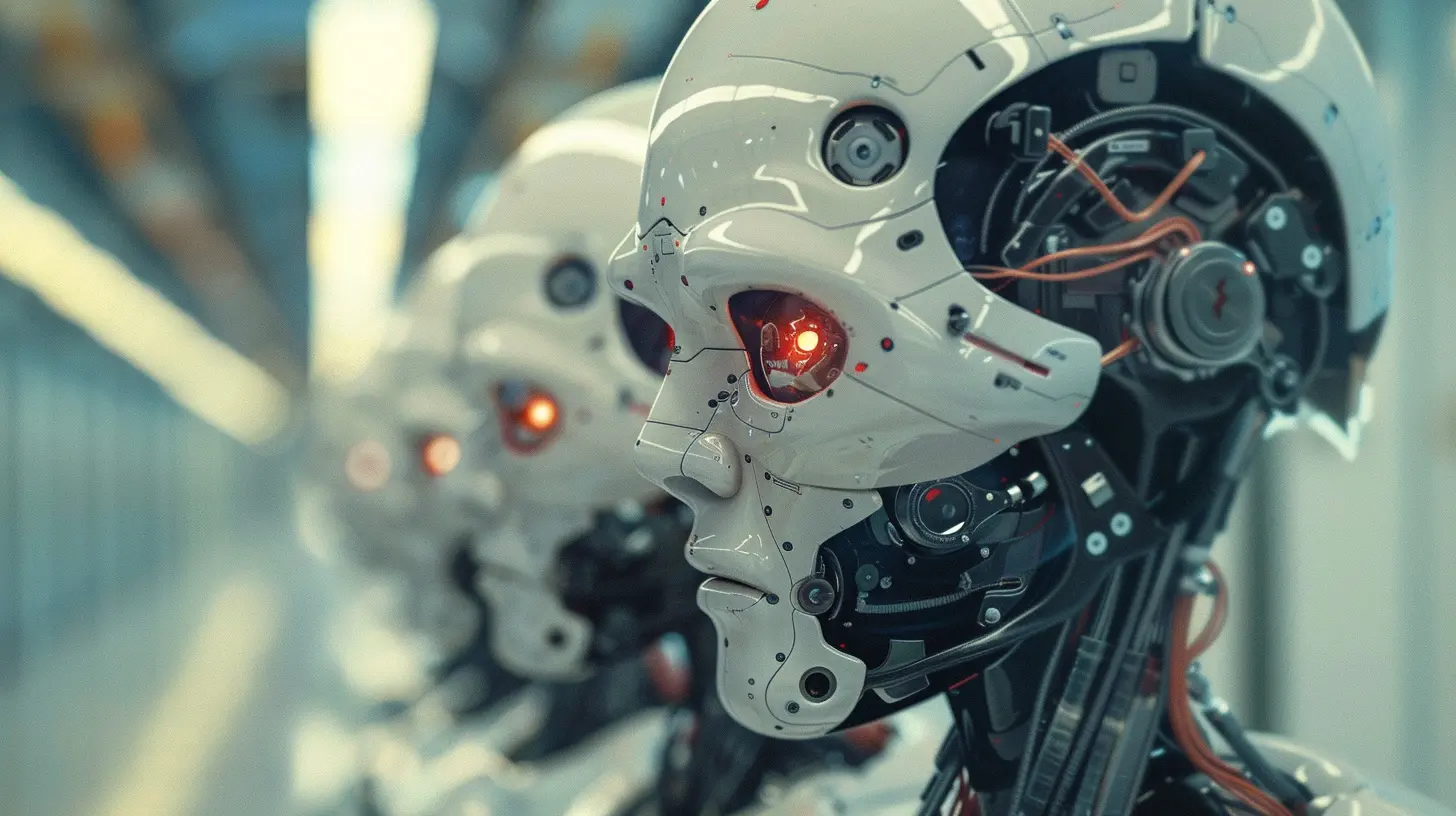How Tech Is Revolutionizing the Future of Work
21 November 2025
Let’s talk about something that’s affecting all of us—how we work is changing. Big time. And if you've noticed your 9-to-5 looking a bit different than it did a few years ago, you're not alone. The truth is, technology is flipping the script on the traditional workplace. From how we clock in, to where we sit (or don’t sit), to how projects get done—tech is the driving force behind a workplace revolution.
In this article, we're diving deep into how tech is revolutionizing the future of work. Buckle up, because it’s not just about smart gadgets or Zoom meetings—it’s about a global transformation that’s reshaping industries, careers, and the way we define “work” itself.
The Digital Shift: Beyond the Office Walls
Remember cubicles? Yeah, those grey little boxes that made up the stereotypical 90s office? They’re basically relics now. Thanks to digital tools, work isn’t tied to a specific location anymore. Remote work has gone from a “nice-to-have” perk to a full-blown expectation.Remote Work Is Here to Stay
When the pandemic hit, millions of people went home to work, thinking it was temporary. Fast forward, and remote work is now a long-term strategy for a lot of companies. Thanks to collaboration tools like Slack, Zoom, Trello, and Microsoft Teams, teams can work together seamlessly from anywhere in the world.And it’s not just about working from your kitchen table. This shift has also made global hiring a lot easier. Companies don’t have to settle for local talent anymore—they can hire the best person for the job, regardless of their ZIP code.
Coworking and Hybrid Setups
Some folks miss the buzz of the office (and let’s be honest, the coffee machine chats). That’s where hybrid work models and coworking spaces come in. Tech enables smoother transitions between remote and in-office work. Cloud-based systems, virtual private networks (VPNs), and secure digital infrastructure mean you can literally pick up where you left off—whether you're home, in a cafe, or at the office.
Automation and AI: Taking Over? Not Exactly.
Let’s get one thing straight: robots are not out to steal your job. But they are changing the kinds of jobs that exist—and that’s actually pretty exciting.Automating the Boring Stuff
Think of automation as your new digital assistant. It handles the repetitive, time-sucking tasks—like data entry, scheduling, and inventory management. This frees up human ingenuity for what we’re really good at: creativity, critical thinking, and emotional intelligence.For example, chatbots now handle most customer inquiries, self-checkout kiosks have transformed retail, and AI systems are sorting through thousands of resumes in seconds. It’s not about replacing humans; it’s about empowering them to do more meaningful work.
AI in Decision-Making
AI isn't just about doing things faster—it's about doing them smarter. Machine learning algorithms are helping businesses make better decisions. Think predictive analytics for sales trends or AI-driven market research.In healthcare, AI can analyze thousands of patient records to help doctors make more accurate diagnoses. In finance, it can detect fraud in seconds. The future isn’t man versus machine—it’s man working with machine.
The Rise of the Gig Economy and Freelance Platforms
Ever heard the term “digital nomad”? That’s the gig economy in action. Technology has given rise to a whole new way of working—one that’s way more flexible and independent.Freelancing Has Exploded
Platforms like Upwork, Fiverr, and Toptal let professionals offer their skills to businesses around the world. Whether you're a graphic designer, copywriter, or software engineer, you can build a career on your own terms.This flexibility isn’t just great for freedom—it’s also reshaping how employers think about hiring. Companies can now scale their teams up or down easily, tapping into specialized talent when they need it without committing to full-time hires.
Challenges? Sure, But Solvable
Of course, the gig economy has its downsides—like job insecurity and lack of benefits. But tech is even solving that. Apps now offer freelancers access to healthcare, invoicing tools, tax management, and more. The ecosystem’s growing rapidly, and tech is fueling its evolution.
Learning and Upskilling in Real Time
A decade ago, you'd get a degree, land a job, work your way up, retire. That story’s gone the way of floppy disks. Tech is changing the learning curve.Microlearning and Online Courses
With platforms like Coursera, Udemy, and LinkedIn Learning, you can learn just about anything without setting foot in a classroom. Data science? Coding? Marketing? Done. And the best part—these platforms use AI to recommend exactly what you need based on your career goals.Skill-building is becoming part of the job itself. Employers are encouraging continuous learning, and tech is making it ridiculously accessible.
Virtual and Augmented Reality in Training
Now we’re getting into sci-fi territory. VR and AR are revolutionizing on-the-job training. Imagine learning surgery through a VR headset or training for a factory job via an augmented reality overlay. It’s not just cool—it’s practical and safe.Collaboration Tools: Communication Without Boundaries
Emails are so last decade. Today’s workplaces run on real-time communication. The future of work is all about staying connected—no matter where you are.Real-Time Messaging and Video Conferencing
Slack channels are the new water cooler. Zoom meetings have become synonymous with office life. These tools are more than digital replacements for in-person interactions—they actually improve efficiency and reduce misunderstandings.Plus, they’re scalable. Whether you’re a five-person startup or a 5,000-employee corporation, these tools make communication smoother and quicker.
Project Management Made Simple
Tools like Asana, Monday.com, and Jira help teams stay on track, manage tasks, and meet deadlines—without a flood of emails. And because everything’s in the cloud, transparency and accountability go through the roof.Cybersecurity and Data Privacy: Guarding the Digital Workplace
More digital = more data. And with data comes risk. As we shift more of our work online, cybersecurity becomes critical.The Rise of Cyber Threats
Phishing scams, ransomware attacks, data breaches—the threats are real. But so are the solutions. Companies are investing heavily in cybersecurity tech, from firewalls and encryption to AI-powered threat detection.Privacy by Design
We’re also seeing a shift toward “privacy by design,” where tools and platforms are built with user privacy in mind. That means more secure authentication (hello, biometrics), better data encryption, and stricter compliance with regulations like GDPR and CCPA.The Role of Blockchain in the Future of Work
We can’t talk tech without touching on blockchain. Yes, it’s more than just crypto.Decentralization and Trust
Blockchain can decentralize operations, improving transparency and trust. Think about smart contracts that execute automatically, reducing dependency on third parties. Or imagine verifying credentials of job applicants instantly through a blockchain ledger.Payments and Payroll
Cross-border payments in the gig economy? Solved. With blockchain, freelancers can be paid instantly in their preferred currency, with lower transaction costs and better security. Goodbye, wire transfer delays.Tech and Employee Well-Being
Work isn’t just about getting things done—it’s also about how we feel while doing it.Health Tech at Work
Wearables like Fitbits or Apple Watches can help monitor stress, physical activity, and even sleep. Some companies are integrating wellness tools into their daily operations—think reminders to take breaks, guided meditations, and health challenges.Mental Health Apps
Tools like Headspace, Calm, and BetterHelp are making it easier to access mental health support. And thanks to AI, some platforms are even offering real-time emotional support through chatbots.The Road Ahead: What to Expect in the Next 5–10 Years
We’ve barely scratched the surface. The next decade is going to bring even more dramatic changes.AI-Powered Personal Assistants
Think smarter than Siri. We’re talking about AI assistants that understand your work habits, schedule your meetings, prioritize your tasks, and even help write your emails. Don’t worry, you’ll still be the boss—just with a supercharged sidekick.Smart Offices and IoT
Your office might soon adjust lighting, temperature, and even noise levels based on who’s working there. IoT (Internet of Things) is creating environments that adapt to humans—not the other way around.Ethical Tech
With all this innovation, ethical questions are cropping up too. How do we balance AI and privacy? What happens when automation disrupts entire industries? Expect more debate around ethics, sustainability, and the human side of tech.Final Thoughts
So, how tech is revolutionizing the future of work? In pretty much every way imaginable. From where we work to how we learn, communicate, get paid, and stay healthy—technology is at the center of it all.And this isn’t just a phase. It’s a fundamental shift in how the world operates. Sure, it comes with challenges (as all revolutions do), but it also opens up exciting opportunities—for businesses, employees, and entrepreneurs alike.
If you’re someone who wants to stay ahead of the curve, now’s the time to lean into this tech-driven future. Embrace it. Learn it. Ride the wave—because the future of work is already here.
all images in this post were generated using AI tools
Category:
Tech NewsAuthor:

Gabriel Sullivan
Discussion
rate this article
2 comments
Camille Reese
This article insightfully highlights how emerging technologies like AI, automation, and remote collaboration tools are reshaping the workplace landscape. By enhancing productivity and creating flexible work environments, tech not only boosts efficiency but also fosters innovation. As we embrace these changes, the future of work promises to be more dynamic and inclusive.
December 7, 2025 at 5:40 AM
Zacharias Hernandez
This article insightfully highlights the transformative impact of technology on the workplace. As automation and AI reshape job roles, it’s crucial for workers to adapt and develop new skills to thrive in this evolving landscape.
November 21, 2025 at 5:14 AM

Gabriel Sullivan
Thank you for your thoughtful comment! Adapting to technology is indeed essential for success in the evolving workplace.

